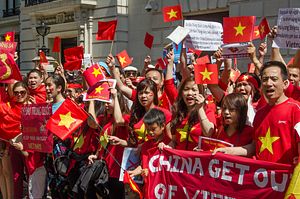To a certain degree, concerns and even fears over the rise of China has transformed into a kind of “China-phobia” in part of the international community. This is particularly true with regard to China’s growing ambitions in its territorial claims in the East and South China Seas and its perceived endeavors to break down and reconstruct the U.S.-led world financial system. A relatively tolerant or even welcoming attitude by some states toward Japan’s somewhat revisionist or right-wing policies provides a striking contrast to accusations of China’s allegedly “dangerous” and “irresponsible” behaviors in disputed waters.
For another example, on historical issues relating to the Imperial Japanese invasion, the Chinese government’s attitude has often been pictured as nationalist propaganda intended to either mobilize public support or transfer domestic pressure, while the same criticisms and comments are rarely heard when South Korea’s government takes a similar stand.
When rational concerns and constructive criticisms transform into a genuine “China-phobia” that targets policies, claims, and suggestions from China, no matter what they are, there’s not much room for any states to talk out problems — not even China itself, since it may find itself being pushed into a corner.
Fortunately, the situation has yet to become that gloomy, but a storm is gathering, particularly around the South China Sea. The question is: has China truly become so powerful and so blindly militaristic that it deserves all the blame and accusations being heaped upon it? China’s policies and somewhat reactive behaviors may naturally draw concerns from other claimants in the South China Sea. But the United States, for example, claims to takes no position on the sovereignty claims, saying its main concern is to protect the freedom of navigation. Has freedom of navigation actually been obstructed by Chinese fleet in any case?
The U.S. wasn’t always so vocal about opposing China’s claim. As Chinese Foreign Minister Wang Yi has pointed out, after World War II, Chinese troops actually went on board U.S. military vessels on their voyage to the Spratlys, which had been occupied by the Japanese. Wang said the Chinese troops reclaimed China’s sovereignty over the islands after the end of war, with the support of Cairo Declaration and the Potsdam Proclamation — and the United States.
China today is not a monster; rather, it is sometimes a “bull in a china shop.” It is a “returning” major power in the region, and must constantly find ways to merge into the prevailing world system, full of rules and regulations to which China is (and will continue to be for some time) a newcomer. Meanwhile, the most complicated, challenging, and significant task for China in dealing with its territorial disputes is to find a balance (or possibly a connection) between its historical justifications and contemporary institutional or legal regulations. Fortunately, negotiation is still an option for all states involved, including China.
China is still a “fragile superpower” (to quote Susan Shirk) in some ways, most obviously when it comes to China’s domestic transformations. It is neither a mighty hero that will soon take over global leadership from the U.S., nor a truculent monster that will choose to turn its friends into enemies. It is rising and expanding externally and naturally receives suspicion and criticism as it intends to protect its national interests, just as any state would.
This is not to reject the concerns and worries China’s policies and behaviors may have sparked in the international community. Rather, I would suggest that the way we see and understand China alters the way we deal with it — in ways more consequential than we might expect.

































